Hall of fame: Ronaldinho — El Gaucho
What separated Ronaldinho from the pack of ‘legends’ was his seemingly unending talent.
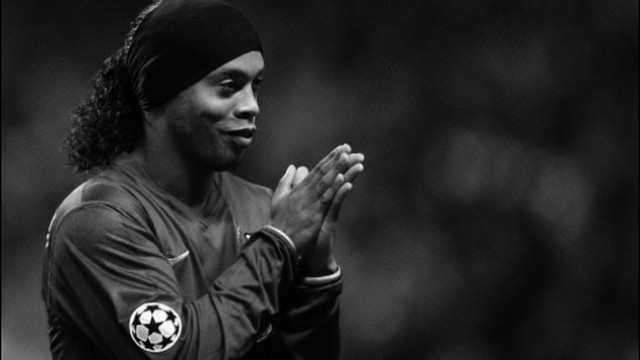
Only a few men in the history of football are capable of evoking emotions of complete bewilderment in fans. ‘El-Gaucho’, as some call him, caused a riot in London when Barcelona faced Chelsea in the second leg of the Uefa Champions League Round of 16 in 2005. After going 4-2 down on aggregate within 20 minutes of the game, Barcelona were hoping for a miracle at Stamford Bridge. But the all-star encounter was overshadowed by the performance of one man — Ronaldinho.
A man capable of making defenders like John Terry and Ricardo Carvalho look like amateurs, all eyes were on the brilliant Brazilian. After scoring a penalty and being man-marked to the extent that he could feel the defender’s breath on his skin, ‘Ronnie’ was making it look easy as he swayed past defenders throughout the game.

But the Bridge truly fell silent in awe when Dinho the sorcerer performed an exclusive trick for the crowd. Receiving the ball at the edge of the penalty box, Ronaldinho, surrounded by a barrage of defenders, moved his right foot in both directions towards the ball and calmly toe-poked it into the bottom left of Petr Cech’s goal. The most amazing aspect of this goal was how still the goalkeeper and defenders were as soon as Ronaldinho hit the ball; with almost no back-lift.
Throughout his illustrious career, the exuberant Brazilian has been a joy to watch. With a smile on his face and the attitude of a true sportsman, Ronaldinho travelled from his hometown of Porto Alegre, to Paris Saint-Germain (PSG) and then to Barcelona, where he truly became one of the most dominant footballers of his era.
After captivating performances with Gremio, Ronaldinho demanded a transfer to PSG, where he established himself as an upcoming talent. The stint with the French giants got him on Barcelona’s radar.
The international success of the 2002 World Cup, where Ronaldinho scored one of the greatest goals in the tournament’s history against England, cemented his place as a top target for other teams. But issues with PSG’s management made it easier for Barcelona to snatch the Brazilian, who outbid Manchester United to grab Ronaldinho for a rumoured fee of €30m.
All the other clubs expected Ronaldinho to explode once he reached Catalunya, but no one ever imagined the level to which he would demolish his competition. The first half of the 2003-04 season was marred by Ronaldinho’s injury and Barcelona slumping to a mid-table finish.
With Samuel Eto’o, Deco, Ludovic Giuly and Henrik Larsson joining Ronaldinho to form a formidable strike force, Barcelona won their first La Liga title since 2000 in the 2004-05 season. Being crowned the World Player of the Year in the same year was just an accolade to cement his place in the hearts of the Camp Nou crowd.
“He transmits a lot of joy and pleasure playing the game,” said Barcelona coach Frank Rijkaard. “He has individual skills that are of such a high level that everybody in the world adores him.”
His impact on everyone who was a part of Barcelona was appreciated by teammates. Goalkeeper Victor Valdes spoke of El Gaucho’s ability, “He is the biggest talent I have seen in football. Ronaldinho, when he arrived, changed the history of this club.”
Despite scoring a whopping 70 goals for Barcelona in 145 appearances, Ronaldinho was known more for his tricks and his ability to change the game singlehandedly. Barcelona looked unstoppable when he was at his peak.
By 2005, Ronaldinho’s performances won him a plethora of personal awards. He was honoured the Ballon d’Or, and was also voted the Fifa World Player of the year for a second year running; becoming only the third player in history to win the award more than once.
In November, Ronaldinho scored twice as Barcelona defeated Real Madrid 3-0 in the first game of the season. Sealing the match with his second goal, Real fans paid homage to the genius with a standing ovation, a tribute only Diego Maradona was able to achieve at the Santiago Bernabeu.
“I will never forget this because it is very rare for any footballer to be applauded in this way by the opposition fans,” said Ronaldinho after receiving the praise.
Flamboyant dribbling and immaculate control over the ball, added with the flair of a true Brazilian, showcased how he was by far the most gifted player of his generation — if not ever.
In just two years in Barcelona, pundits were wondering, “Is he the greatest player ever to play the game?” This amount of praise was almost unheard of in the history of the sport. Being compared to the likes of Pele and Maradonna in such a brief time was nothing short of extraordinary.
The only Brazilian to ever play in the under-15, under-17, under-20, under-23 and senior teams, Ronaldinho started to fade after a disappointing 2006 World Cup performance, giving an evident impression of a tired man who had toiled hard in the domestic season.
Lacklustre performances for Barcelona in 2006-07, it was clear that he had lost that yard of pace which saw him beat defenders with ease. Ronaldinho started to gain weight and his performances were getting predictable and less efficient.
After transferring to AC Milan, who Ronaldinho demolished in the Champions League when he was in Barcelona, he was no longer the same Brazilian in the eyes of mainstream football. But great performances in Brazilian clubs Flamengo and Athletico Mineiro gave glimpses of his brilliant past as he managed to help Atletico win the Campeonato Mineiro and led the club to its first ever title of the Copa Libertadores.
It is important for us to remember Ronaldinho for his achievements in football, but what separated him from the pack of ‘legends’ was his seemingly unending talent.
Published in The Express Tribune, August 16th, 2014.
Like Sports on Facebook, follow @ETribuneSports on Twitter to stay informed and join in the conversation.

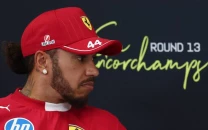
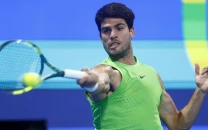
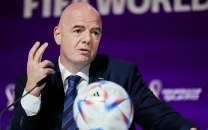
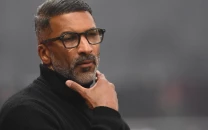
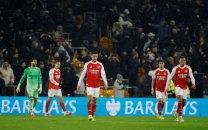













COMMENTS
Comments are moderated and generally will be posted if they are on-topic and not abusive.
For more information, please see our Comments FAQ